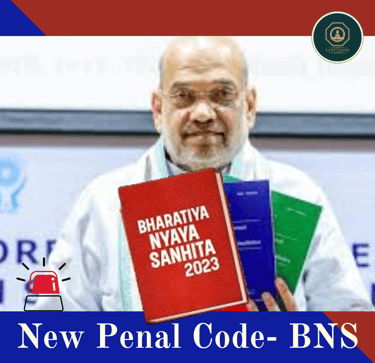Evolution of Indian Penal Code: All about the New Bharatiya Nyaya Sanhita 2023 (BNS)
In this blog, the significant changes introduced by the Bharatiya Nyaya Sanhita 2023 (BNS) are discussed, including the removal of outdated offences like Section 377 and attempt to commit suicide, the introduction of new offences like organised crime and petty organised crime, enhanced and reduced punishments, and a focus on rehabilitation and social reintegration of offenders.
Ananya
7/13/20244 min read


Evolution of Indian Penal Code: All about the New Bharatiya Nyaya Sanhita 2023 (BNS)
Introduction
On July 1, 2024 the three new criminal laws came into force. With the coming into force of the Bharatiya Nayaya Sanhita some offences such as attempt to commit suicide and Section 377 Unnatural Offences were done away with , many new offences such as organised crime are introduced keeping in mind the demands of the society.
Section 106(1) Causing of death by Negligence
This Section now specifically talks about death caused by the Negligence of a ‘Medical Practitioner’. While Section 304 A of the Indian Penal Code, 1860 had no such provision. The Explanation to sub-section(1) in the Sanhita clarifies who is a ‘Medical Practitioner’. According to the Explanation the term ‘ Registered Medical Practitioner’ means a medical practitioner possessing any medical qualifications recognised under the National Medical Commission Act, 2019.
And such a Medical Practitioner for a Death caused by Negligence shall be punished with imprisonment of either description extending to 2 years and fine.
Section 111- Organised Crime
Section 111 of the Sanhita introduces the offence of organised crime. If an ‘Organised Crime Syndicate’ indulges in any ‘Continuing Unlawful Activity’, it is organised crime.An organised crime syndicate according to Explanation (i) of the section is a gang that indulges in Continuing Unlawful Activity.
Explanation (ii) states that ‘Continuing Unlawful Activity’ means a cognizable offence punishable with imprisonment of 3 years or more and economic offences. One of the examples of economic offences(as provided in the Sanhita) is Hawala transactions.
The Sanhita also provides certain examples in Section 106 of ‘Continuing Unlawful Activity’ such as kidnapping, robbery, vehicle theft but these examples are not exhaustive.
Section 112- Petty Organised Crime
The Sanhita under Section 112 makes petty organised crime a separate offence. This includes unauthorised selling of tickets, unauthorised gambling, selling of public examination question papers etc. by a syndicate.
Petty Organised Crime shall be punished with a minimum of 1 year and a maximum of 7 years of imprisonment and the offender shall also be liable to fine.
Section 113- Terrorist Act
The Sanhita also defines Terrorist Act under Section 113 as an act intended to or likely to threaten the unity, integrity, sovereignty, security or economic security of India and also intended to or likely to strike terror in people by the use of bombs etc.
Section 226- Attempt to Suicide to compel or restraint exercise of lawful power
The Sanhita does away with attempt to commit suicide as an offence which used to be Section 309 of the IPC, 1860 but according to Section 226 of the Sanhita whoever attempts to commit suicide with an intention to compel or restrain a public servant from discharging his official duty can be punished with imprisonment extending to 1 year or with fine or with both or with community service.
Section 304-Snatching
Section 304 of the Sanhita makes Snatching a separate offence. Under the IPC,1860 Snatching used to be covered under Theft. And several states such as the states of Haryana and Gujarat had made State Amendments to the IPC,1860 making snatching a separate offence. This made things a bit chaotic. To illustrate, Haryana considered snatching a separate offence while in Maharashtra it was considered a part of Theft. This chaos has now been cleared.
An offender for Snatching can be punished with imprisonment of either description for a maximum of 3 years and fine.
Offences Against the State
Chapter VI of IPC,1860 of Offences Against the State included Section 124A of Sedition. Chapter VII under the new Sanhita of Offences Against the State has no mention of Sedition. But Section 152 of the Sanhita punishes an act endangering sovereignty, unity and integrity of India.
Under the Section attempts to excite, session or armed rebellion or encouraging feelings of separatist activities etc. are punished with imprisonment for life or with imprisonment extending upto 7 years and fine.
According to the Explanation to Section 152, if a person expresses disapproval of measures of the government seeking lawfully from the government an alteration of such measures without exciting any feelings of secession etc. that does not constitute an offence.
Section 103- Murder
Under Section 103(2) of the Sanhita if a group of five or more people in concert with each other commit a murder on the grounds of race, caste or community, sex, place of birth, language, personal beliefs etc. They shall je punished with death or life imprisonment and fine.
What punishments have been enhanced in BNS?
Cheating by Personation
(Sections 319 of BNS,2023, Sections 416 and 419 of IPC,1860). The term of imprisonment prescribed under Section 419 IPC, 1860 for Cheating by Personation could extend to three years. Under the BNS,2023 this term of imprisonment has been increased and can now extend to five years.
Affray
Earlier under the IPC,1860 the amount of fine prescribed for affray was Rs.100.
Now, under the BNS.2023 it has been increased to Rs.1000
Reduced Punishments under BNS,2023
Community service has been introduced in BNS, in 2023 as an alternative to imprisonment. Offences under Sections 202,209,226,355 BNS,2023 can be punished with community service. The theft of a property worth less than Rs. 5,000 by a first time offender can also be punished with community service.
What offences have been deleted in the BNS,2023?
Section 377- Unnatural Offences
The Supreme Court had decriminalised sodomy in Navtej Singh Johar v. Union of India. Otherwise Section 377 of the IPC,1860 was valid.The BNS,2023 has no provision like Section 377 eliminating all forms of Unnatural Offences from its purview.
Section 482- Adultery
The Supreme Court had decriminalised Adultery in Joseph Shine v. Union of India but the provision still marked its textual presence in IPC,1860.
The BNS,2023 has no provision as Section 482 IPC,1860.
Section 309- Attempt to Commit Suicide
There was a conflict between Section 309 IPC,1860 and The Mental Healthcare Act, 2017. This conflict no longer persists as the BNS,2023 does not criminalize attempt to commit suicide( exception section 226)
Conclusion
The three major criminal laws thus stand changed. As societies change, the nature of crime also changes and the criminal laws accordingly should constantly evolve. Some of the evils of the older laws have been corrected. The focus through these laws now is on rehabilitation and social reintegration of offenders rather than punishment, the outdated definitions and outdated fines for certain offences such as Rs. 100 for Affray have been altered and deleted. Clearer provisions for handling economic offences have been included in the BNS,2023. Law is without doubt a remedy for the greater evil yet it brings with it evils of its own. The offence of Bestiality which was punishable under Section 377 of IPC,1860 finds no place in BNS,2023.
With time newer issues would be identified and would have to be corrected even with these laws, its an ever-continuing process.


